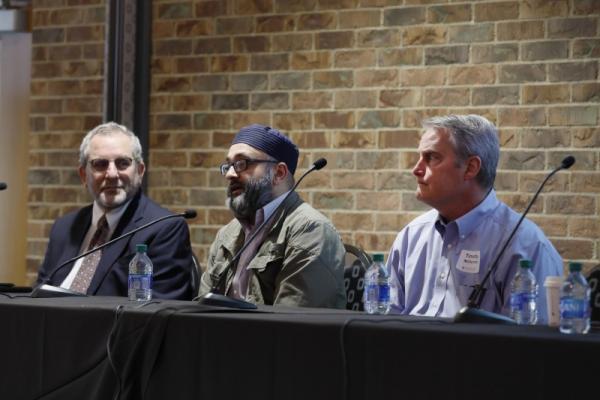Community engagement essential to Ohio State’s land-grant mission, scholars say

Article originally appeared on Ohio State News website.
The Ohio State University strives to maintain mutually beneficial relationships with communities throughout Ohio to fulfill its land-grant mission, administrators and faculty members said during the 2023 Engaged Scholarship Symposium. The event was held last week at the Fawcett Center on Ohio State’s Columbus campus.
Ohio State provides resources that facilitate community-based research and outreach, said Ryan Schmiesing, senior vice provost for external engagement.
“We continue to work on our grant programs to not only focus on what is the impact of our work, but how can we help you as community members and the community representatives here, how can we help you document your impact?” he said. “How can we help you tell your story?”
Panel discussions included “Arts in the Community,” in which Ohio State faculty and staff and community members shared insights on how the university’s arts and agricultural programs can positively impact central Ohio communities – the historic Black community on Columbus’ Near East Side, in particular.
“I’m really encouraged by the number of new faculty in our department but also in others who really prioritize community-engaged work in research and scholarship,” said Monica Stigler, program manager, Department of African American and African Studies Community Extension Center. “It is foundational to their identities, but also to their work and to their advancement in the university.”
Dionne Custer Edwards, the Wexner Center for the Arts’ director of learning and public practice, said young people who participate in the arts administration and policy courses that she teaches bring innovative ideas about how to increase community engagement.
“It’s really nice to be able to work with students to think about new ways of doing community-based practice. It’s also nice to be in conversation with collaborators across the university to think about new ways to be engaged in community-based practice,” she said. “Your research is worthwhile and important, but before you go to study, there needs to be something else that happens. And let’s talk about what that something else might be. Let’s talk about how the relational work happens.”
The “Arts in the Community” panel also included Vice Provost for the Arts Lisa Florman, who served as moderator; Terron Banner, manager of community learning and experience, Ohio State Urban Arts Space; Marshall Shorts, creative-in-chief, Artfluential design firm; and Julialynne Walker, market manager, Bronzeville Growers Market and director, Agricademy.
A second panel discussion centered on Ohio State’s outreach to Ohio’s Arab American and Bhutanese American communities.
Timothy McDermott, assistant professor in the College of Food, Agricultural and Environmental Sciences (CFAES) and an educator for Ohio State Extension, said community engagement is built into the organization.
“We are the outreach arm of the university,” he said, “which satisfies the land-grant mission of the university.”
Although Extension programming is presented free of charge to the community, McDermott said he tries to help participants overcome transportation, child care and other logistical challenges.
“My job is to mitigate barriers,” he said. “I’ll show up when they tell me to, on the topic they want to learn about. If I have to do (programming) in different places, I will do it.”
Ayaz Hyder, assistant professor in the College of Public Health, said students have been instrumental in facilitating a project that helps Arab Americans in Toledo address health challenges during pregnancy and prevent infant mortality.
“We have recruited a student in Toledo who can help the community with on-the-ground work,” he said.
Jeffrey Cohen, professor of anthropology, said Ohio State’s Seed Fund for Racial Justice has provided resources for his work in helping Bhutanese Americans in central Ohio overcome barriers to accessing the internet and tapping into social services that are offered online.
“That was a partnership between the university and the Department of Anthropology and the College of Social Work, the Bhutanese community and the National Institutes of Health to come together to address some of the challenges that community members were facing,” he said. “(Community members) were the experts, we had the tools and Ohio State gave us the resources, and we were able to really begin to answer that question.”
The “Engaging with Bhutanese Americans and Arab Americans in Ohio” panel also included Maurice Stevens, associate dean for engagement, College of Arts and Sciences, who served as moderator, and Sudarshan Pyakurel, executive director, Bhutanese Community of Central Ohio.
